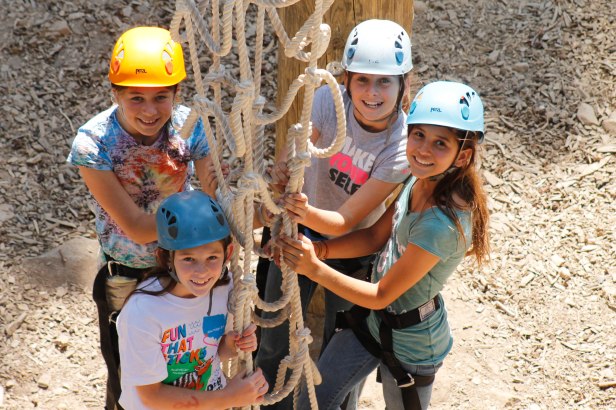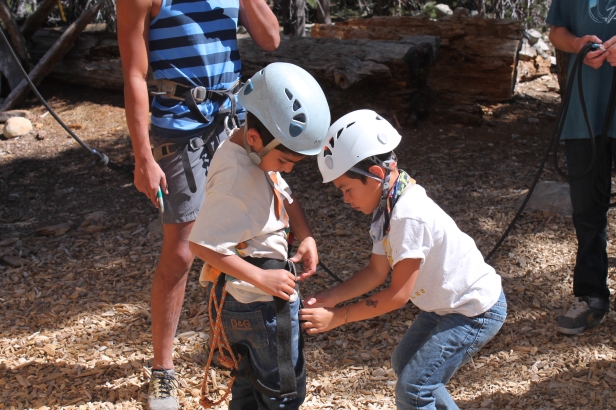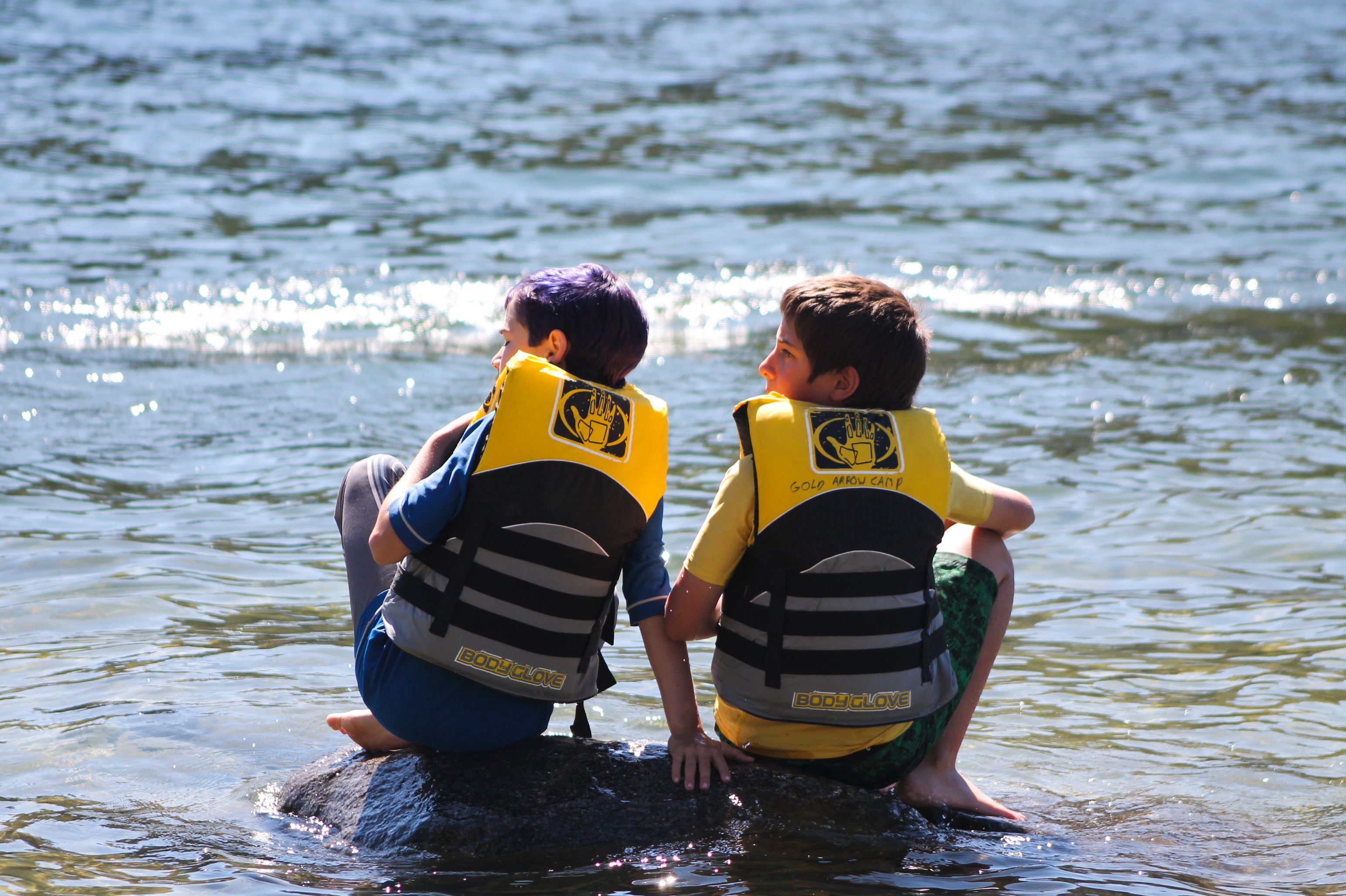Yesterday, my fourth grade son came home from school downcast. It’s his third week at a new school, and I had encouraged him to find a friend or two to invite over to swim. He had asked two boys for their phone numbers, and the boys had said they were “adopted brothers” and written down a fake phone number before getting in different cars to go home. My heart broke for my son.
 My dream is for my kids to attend a school they love as much as they love camp. But for that to happen, schools need to have a different culture and focus. Here are my ideas on how teachers can make schools communities where kids thrive both academically and socially.
My dream is for my kids to attend a school they love as much as they love camp. But for that to happen, schools need to have a different culture and focus. Here are my ideas on how teachers can make schools communities where kids thrive both academically and socially.
Focus on Relationships, Team Building & Goal Setting
The first day of school would start with the teacher leading the students in team building activities and giving them ample opportunities to get to know each other. Kids would be paired and grouped in different ways to make sure that everyone learns each others’ names. New kids would be warmly welcomed by returning kids.
Kids would share their goals for the year and what’s important to them. They would also learn about each others’ talents and interests. This conversation would be on-going throughout the year to give kids the chance to share with and encourage each other as they learn new things.
In all my years of parenting my five kids through school, only rarely have teachers taken the first day to help kids get to know each other really well. My 5th grade son’s teacher this year did a great job with this by having the kids play “Human Bingo” and also making “Shields.” Bravo!

At camp, the entire first day is all about meeting and getting to know each other and sharing. Kids are welcomed into their camp “family.” At camp, a child would never be sitting alone eating lunch – or anywhere else. At school, that should never happen either. There needs to be the social safety net of a culture that is inclusive of all kids, even the new ones, and that doesn’t allow kids to “fall through the cracks” and be alone and lonely.
Foster Social Skills
 If we are so uber-focused on academics, we forget that the social experience at school is equally, if not more, important to our kids’ development. According to Dr. Christine Carter, “…a new study , which followed nearly 1,000 people over 32 years, makes it abundantly clear that preparing kids for academic success does not necessarily lead to happiness. You know what does predict happiness in adulthood, according to the study? Friendship. When kids have a lot of friends in childhood and adolescence, they tend to grow up to be happy adults.”
If we are so uber-focused on academics, we forget that the social experience at school is equally, if not more, important to our kids’ development. According to Dr. Christine Carter, “…a new study , which followed nearly 1,000 people over 32 years, makes it abundantly clear that preparing kids for academic success does not necessarily lead to happiness. You know what does predict happiness in adulthood, according to the study? Friendship. When kids have a lot of friends in childhood and adolescence, they tend to grow up to be happy adults.”-Dr. Christine Carter, “3 Essential School Supplies”
We all know intuitively that this is true. I remember much more about who my friends were during a certain time of my schooling than I remember about the course work. Schools need to make it a priority to help kids foster good social skills. Discussing and teaching skills like how to be a good friend and how to handle conflict are critically important. I love Big Sibling programs at schools, where older students who are good role models are paired with younger kids to welcome them, help them get assimilated, and model good relationship skills.
A line from our camp song says, “I sure did learn much more here than I ever did at school.” Unfortunately, it’s true. In two weeks of camp, kids learn more about being a good friend than many do in all of their years at school. Schools need to spend some time on fostering good social skills in our kids.
Hands-On, Active Learning by Doing
If school were more like camp, hands-on activities would far out-number multiple-choice tests. The information that really “sticks” is the stuff we do, so why is so much time spent on memorizing things that are forgotten within days?

If school were more like camp, students would spend less time sitting at a desk quietly working by themselves on a work sheet and more time practicing teamwork and collaboration, working on science projects and presentations, acting out a book they are reading, and building their creativity and problem-solving skills.
Students would be encouraged to delve deeply into topics that interest them, regardless of what’s on the list of standards.
A Positive Culture
If school were more like camp, teachers would be trained to create a fun, warm, and inviting place as much as they are trained to teach math skills. They would learn how to find what is special and unique about each of their students and help their students feel valued and included.

Teachers would check in with each student, every day, asking how they’re doing and providing support if they are struggling.

Kids would be excited to get to school, and teachers would greet each student with a smile and a high five, hug, handshake, or fist bump.
If school were more like camp, kids would be cheering for and supporting each other as they learn new skills. Kids would celebrate each others’ successes by making daily “WOW” announcements and leaving encouraging notes. For kids who are struggling in some area, supportive peers would provide guidance and encouragement. Kids would openly talk about their areas of strength and weakness and support each other in improving.
Core Subjects Plus “Free Choice” Learning & Pursuit of Passions
At camp, we require that kids participate in certain activities, even if they’re a little scared. We know that they benefit immensely from challenging themselves and building new skills. But we also allow kids to pursue activities that they are passionate about. What if school could be the same way? Kids would be required to learn specific skills, of course, just like they are now. But they would also have more free choice options to pursue things they’re passionate about. Aspiring writers could have thei r own blog. Future doctors could do extra science research and experiments. If we showed more respect for kids’ interests and desires and let them spend more time on things that they are passionate and excited about, school would be a much happier place for them.
r own blog. Future doctors could do extra science research and experiments. If we showed more respect for kids’ interests and desires and let them spend more time on things that they are passionate and excited about, school would be a much happier place for them.
 r own blog. Future doctors could do extra science research and experiments. If we showed more respect for kids’ interests and desires and let them spend more time on things that they are passionate and excited about, school would be a much happier place for them.
r own blog. Future doctors could do extra science research and experiments. If we showed more respect for kids’ interests and desires and let them spend more time on things that they are passionate and excited about, school would be a much happier place for them.
And so, I end where I began. Schools could learn a lot from summer camps. Many people, especially those who never attended camp, don’t understand why kids love camp so much. Even kids who don’t like school.
There are lessons we camp people can teach if schools will listen.
No comments:
Post a Comment
Note: Only a member of this blog may post a comment.